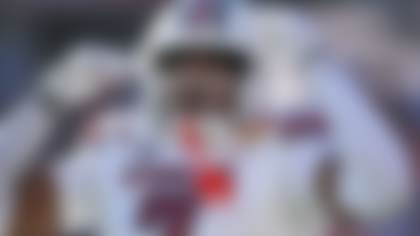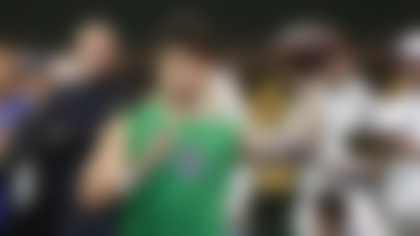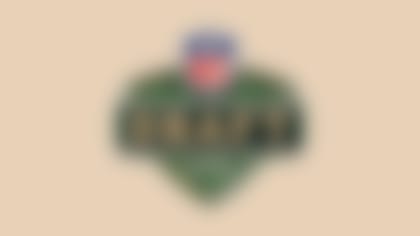Tez Doolittle isn't among the 325 draft-eligible players invited to the NFL Scouting Combine, which starts this week in Indianapolis.
The nose tackle is among several players on the outside, hoping a good performance in Auburn's March 10-11 pro-day workouts -- where scouts will hover to see other players they'll probably see at the combine -- gets him drafted, or at least a tryout.
"I told Tez, just like someone told me, 'It's not where you start but where you end up,'" Dallas Cowboys nose tackle Jay Ratliff said.
Garden State grows prospects
Seven players who have New Jersey ties, including offensive tackle Eugene Monroe, could be drafted in the first round this year, NFL.com's Pat Kirwan writes. **More ...**
Ratliff ended up playing in his first Pro Bowl this month -- four years removed from being in the same position as Doolittle. Ratliff, also an Auburn product, wasn't invited to the combine, where likely draft picks are evaluated by officials from the NFL's 32 teams.
Ratliff showed well enough at the East-West Shrine Game to be noticed by a few NFL teams in attendance but not well enough to be added to the combine roster.
His performance at Auburn's Pro Day, which featured running backs Ronnie Brown and Cadillac Williams, cornerback Carlos Rogers and quarterback Jason Campbell, was good enough to pique the interest of at least one team. That's all it took.
The Cowboys drafted Ratliff in the seventh round. Now he's viewed as one of the top nose tackles in the league.
"To this day, I still don't know why I wasn't invited," Ratliff said about the combine. "I always wondered that. People may have been afraid because I went to Auburn as a tight end, then was moved to defensive end, then to nose tackle. I guess they weren't sure because I only spent a year at each position.
"The only thing I know is not getting invited made me that more determined and a lot hungrier. I don't regret anything that happened. It just gave me unbelievable drive. It made me want to go harder. Thinking about it now, I'm getting that feeling all over again. You get looked over, and nobody expects you to make it. When you do, you can tell everybody that you didn't have anything handed to you, but that you've earned it."
A committee of selectors chooses which players are invited to combine. None of the selectors has ties to any particular conference, university, program or player representation agency, although coaches and agents routinely lobby for players to be invited. Typically, the number of those players invited comes out to around 325.
Roughly one-third of the players who are invited to the combine aren't drafted. A couple dozen players who aren't invited are drafted each year. From 1999 to 2007, nearly 190 players who weren't invited to the combine were drafted. Dozens more non-invitees latched on to teams as free agents.
The main reasons players don't make the combine are injuries, having non-NFL-type measurables, a lack of production and playing against lesser competition.
For that group of players, it sometimes takes sheer persistence, luck -- and ingenuity -- to be noticed.
At last year's combine, Jason Dillard, a first-time agent based in Sacramento, Calif., resorted to a grass-roots hustle that mirrored the success stories of musical artists who sold CDs out of the trunks of their cars.
Dillard stood in the main hallway outside where players worked out at the combine, tracked down coaches, scouts and general managers, and handed them T-shirts and flyers with an ultra-creative pitch to draw attention to his only four clients: Clifton Smith and Damon Jenkins (Fresno State), Roy Lewis (Washington) and Mil'Von James (UNLV).
The shirts and flyers posted the players' pictures and vital statistics all under the banner of "Missing," much like the missing-persons insignias on the side of milk cartons. The dates that they were listed as missing coincided with the dates their respective position groups were scheduled to work out at the combine. The tactic generated a lot of attention because of its uniqueness, but that was about it.
None of Dillard's players were drafted.
"I'm thinking that I've got to go outside of the box and try to come up with something that nobody else is going to come up with," Dillard said. "I'm putting myself out there to either be appreciated or laughed at. I'm sure there were people asking, 'Who is this clown?' I just preached to them to consider my guys, for five seconds, five minutes, five weeks or five months. The experts weren't saying anything about any of my guys, so I had to."
After the draft came and went without his phone ringing, Dillard sent all 32 NFL teams an e-mail that included YouTube highlight clips of Smith, a running back and return specialist. The e-mail also pointed out that Smith was the nephew of former San Francisco 49ers safety Tim McDonald. Thirty-one teams passed on giving Smith a look.
One didn't.
"Bruce Allen, the [former] GM in Tampa Bay, got back to me and said they'd give him a weekend tryout," Dillard said. "All he was told to bring was his cleats."
Smith brought his cleats -- and some attitude.
"I didn't get invited to anything, no East-West Shrine Game, no Senior Bowl, no combine, nothing," said Smith, who moved from cornerback to running back at Fresno State. "Nobody gave me a chance. During the combine, I was still at school, but I watched some of the workouts of guys on TV. I was watching and saying to myself, 'This is incredible. I can't believe that I couldn't get an invite. I should have been one of those guys there.' I had to tell myself not to stress.
"At my Pro Day, there were maybe seven scouts, and they were there to see other guys, really. I wasn't even on the players-to-watch list. That's why, when I went into camp, I went in with a chip on my shoulder and made sure I was going to stay."
Like Ratliff, Smith just played in the Pro Bowl, earning the honor as the NFC's return specialist following a season in which he played in just nine games but returned 36 kickoffs for 992 yards, including a 97-yard touchdown. He also returned a punt 70 yards for a touchdown.
Mark Slough represents Ratliff and a handful of other players who weren't invited to the combine yet went on to land spots on NFL rosters. One of Slough's clients is Anthony Madison, a highly regarded special-teams player for the Super Bowl champion Pittsburgh Steelers.
"The NFL and the people who work for these teams are very good at finding and evaluating talent," Slough said. "There are reasons guys don't get invited to the combine, and they are almost always legitimate. There's a blemish somewhere. The one thing, as an agent, that you can't do is oversell a team on your client. You fight like crazy to get them into the all-star games and any other way to garner them recognition.
"The one thing you can make sure of is that your guy is prepared if he gets his bite at the apple. Like I said to Jay, nobody cares now that you were a seventh-round pick now. Maybe when you started, but not now. It's really about getting that ticket into the dance and knowing what to do when you get there."
Ratliff said being ultra-prepared is the only reason he is in the NFL. While players trained for the combine by doing drills to bring down their 40-yard-dash times and increase their bench-press repetitions, Ratliff said he watched films and worked on game-style technique drills. Ratliff figured if he got a shot, teams wouldn't ask him to run sprints or push weights. They wanted to see if he could make plays.
"I knew I had to make an impression, and when we had a meeting at minicamp, Bill Parcells said the only way most of us were going to make it was on special teams," Ratliff said. "I didn't stop and look at the roster numbers or how deep we were on the defensive line. I looked at the special-teams depth chart.
"I had small goals: To make the team, to find my role on special teams and then be active on game days. I also made sure I knew everything. My techniques were solid, and I hustled in drills. In drills, I always ran back to the huddle, and nobody else really did, and the coaches liked that because everybody else started doing it.
"I knew my playbook, too. I didn't make a lot of mental errors. I always looked back and said that some of the guys who went to the combine and played in those all-star games and did a lot of that other stuff might have forgotten about the little things that got them invited there. I didn't forget. I worked harder because I didn't get what they did."
Added Smith: "When I made the Pro Bowl, of course I wanted to go around and puff my chest out and say to a lot of people, 'You didn't want to give me a chance, and now look.' But that's not who I am. I just went about being me, and I tried to stay humble. You don't want to make people feel stupid. They know they messed up.
"I really wouldn't change things. It's who made me what I am. It's how I got to the best situation. The way I got here, more than anything else, made me respect the process, the game and made me want it even more."



